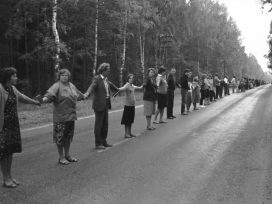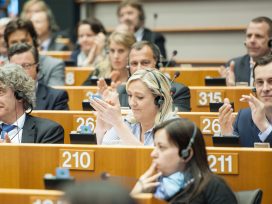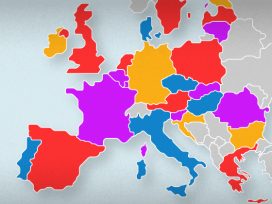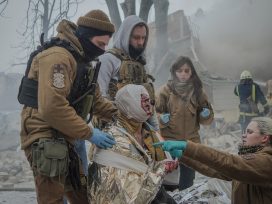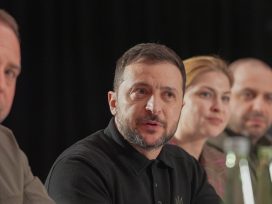On 28 November 2016, the Presidium of the General Council of the ruling Russian party ‘United Russia’ took a decision to sign an agreement on collaboration and cooperation with the far-right Freedom Party of Austria (Freiheitliche Partei Österreichs, FPÖ), at the time led by Heinz-Christian Strache. The timing was hardly accidental: on the 4 December, Austrians were electing a new president and the polls gave the FPÖ candidate, Norbert Hofer, a good chance of winning. Although Hofer lost the election, he and the FPÖ leadership travelled to Moscow and, on 19 December, signed the agreement with the Deputy Secretary of the General Council of ‘United Russia’, Sergei Zheleznyak, who was responsible for the party’s international relations.
On 6 March 2017, the Italian far-right party Northern League (Lega Nord, LN), led by Matteo Salvini, signed a cross-party agreement with United Russia almost identical to the one between United Russia and the FPÖ the previous year. Lega Nord had been wooing Moscow at least since autumn 2014. In the LN’s case, the timing was less dramatic, but still significant. On 4 December 2016, Italy had held a constitutional referendum, initiated by prime minister Matteo Renzi. The Italians rejected Renzi’s proposals and he resigned from his post, giving way to the caretaker prime minister Paolo Gentiloni. When Salvini and Zheleznyak signed the agreement in March 2017, the latter wished the LN best of luck in the early elections. United Russia pulled a similar ‘trick’ in Serbia in April 2017: less than two weeks before the Serbian parliamentary elections, ‘United Russia’ signed a cooperation agreement with Nenad Popović’s ardently pro-Kremlin Serbian People’s Party (Srpska narodna partija).
The texts of the FPÖ/LN agreements with ‘United Russia’ state that they were driven by ‘the desire to facilitate the expansion and deepening of multilateral cooperation and collaboration’ between the countries. The parties would share information about domestic and world affairs and compare experience in party building, organisational work, economic development and legislation. This would take place through regular exchanges of delegations and at conferences, seminars, roundtables and various bilateral events. The parties also agreed to ‘support the development of economic, trade and investment cooperation’.
The agreements prompted concerns that the FPÖ and LN would – were they come to power – pursue policies favourable to the Kremlin. These concerns became especially pronounced after the strong performance of the FPÖ in the parliamentary elections in Austria on 15 October 2017 and of the LN in the Italian parliamentary elections on 4 March 2018, when it became clear that both would become coalition partners in national governments. It should be stressed that, so far, there has been no evidence to suggest that the Kremlin was significantly involved in supporting the FPÖ or LN in the elections.
No direct support
Russian non-interference in Austria and Italy can be attributed to two major factors: (1) the conflict of political interests and (2) the political landscape in the two countries.
First, Austria’s main parties – the Austrian People’s Party (Österreichische Volkspartei, ÖVP) and the Social Democratic Party of Austria (Sozialdemokratische Partei Österreichs, SPÖ) – have themselves not been known for a particularly anti-Kremlin stance. When the two parties had formed the coalition government, chancellor Christian Kern (SPÖ) called ‘for a rethink on sanctions imposed on Russia’, while foreign minister Sebastian Kurz (ÖVP) urged for a gradual lifting of EU sanctions ‘in return for each step forward on the Minsk agreement’. Both the ÖVP and SPÖ are close to big businesses that have developed strong ties with Russia (e.g. the oil and gas company OMV and Raiffeisen Bank International). Even though the FPÖ was the most pro-Kremlin party in Austria at the time, and had been engaged in various pro-Kremlin activities since 2008, Moscow’s support for the far right in the 2017 elections would most likely have damaged – or at least tainted – the Kremlin’s relations with the ÖVP and SPÖ.
The picture is similar in Italy. Although the LN appeared to be the most pro-Kremlin party in Italy, boasting that it was the first EU-based party that had sent a delegation to Russia-annexed Crimea, other Italian parties also voiced support for Moscow in its conflict with the West, which started with the Russian annexation of Crimea and invasion of eastern Ukraine. The centre-right ‘Forward Italy’ (Forza Italia), led by Putin’s personal friend Silvio Berlusconi, the far-right ‘Brothers of Italy’ (Fratelli d’Italia, FdI), and the populist Five Star Movement (Movimento 5 Stelle, M5S) have all criticised the EU’s sanctions on Russia and/or echoed the Kremlin’s narratives on the EU and NATO. Providing material support to just one of the four Russia-friendly parties during the electoral campaign in Italy would necessarily have undermined Moscow’s relations with the other three.
Second, public opinion polls conducted in the months leading up to the parliamentary elections showed that both the FPÖ and LN enjoyed considerable support. The FPÖ was polling at between 24 and 27 percent in September 2017, while the LN was polling at between 13 and 14 percent in February 2018. Given the political landscape in both Austria and Italy, as well as the strong position of Russia-friendly parties, Moscow probably inferred that the new governments would be unlikely to be more sceptical towards Russia than the previous ones. Quite the opposite: Moscow hoped – and liberal forces feared – that Austria and Italy would move closer to Russia and take practical steps to change the EU’s approach towards the Putin regime.
Immediately after the Austrian elections, Zheleznyak asserted that the victory of the ÖVP and growth of the FPÖ attested to ‘the strengthening of positions of patriotic forces and Eurosceptics in Austria and Europe’. The two parties, he said, would form a coalition government that would ‘reflect the specific national interests of the country’s citizens, rather than vague and controversial Euro-values [evrotsennosti]’. Sebastian Kurz had ‘repeatedly spoken about the futility of anti-Russian sanctions’, while Heinz-Christian Strache had ‘supported the referendum in Crimea, did not fear cooperation with Russia, and was critical of the EU’s policies’. Zheleznyak was ‘sure’ that Austria would develop ‘a more active position towards European institutions’ and towards the ‘broadening of cooperation between Russia and Austria’.
Zheleznyak made similar statements after the Italian parliamentary elections in 2018. In his opinion, the victory of the centre-right coalition (formed by ‘Forward, Italy’, LN, FdI and ‘Us with Italy – Union of the Centre) showed that European social attitudes were ‘increasingly shifting from vague and controversial European points of reference towards national interests’. According to Zheleznyak, ‘United Russia’ and the LN were united by ‘the defence of the interests of the people of [their] countries and support for ideas of fairness, preservation of traditional values and the development of national economies’. Together with its partners from LN, ‘United Russia’ opposed ‘any unlawful restrictions, pressure and sanctions’. The LN had openly supported Crimea’s ‘re-unification with Russia’ and had expressed solidarity with Russia’s ‘fight against terrorism in Syria’. He believed that Italy would witness ‘internal and external transformations that would positively influence bilateral relations with Russia, as well as strengthen European-wide trends of restoring the dialogue with Russia’.
Limited leverage
In order to assess whether the FPÖ or LN delivered on Zheleznyak’s – and Moscow’s – hopes once they entered government, it is crucial to underscore that none of the parties’ leaders was appointed to a position that would give them any significant leverage in their countries’ dealings with the EU and Russia.
The Austrian president, Alexander Van der Bellen, a former Green party MP, apparently convinced the new Austrian Chancellor, Sebastian Kurz (ÖVP), not to allow the FPÖ to occupy the post of Foreign Minister. The FPÖ did successfully nominate the independent Karin Kneissl as foreign minister, however Kurz brought European affairs under his personal control, thus minimising the FPÖ’s possible influence on the Austria’s relations with the EU and Russia.
In Italy, a coalition government was formed by the M5S and LN, however the post of prime minister was taken up by the non-partisan academic Giuseppe Conte. Enzo Moavero Milanesi, an independent politician known for his pro-European stance, was appointed Foreign Minister. Milanesi provided balance to the independent Eurosceptic Paolo Savona, who became Minister of European Affairs.
In terms of its actions and statements on the ‘Russian question’, the FPÖ turned out be a disciplined coalition partner of the ÖVP. In the vote in the European Parliament on the resolution on ‘Russia, notably the case of Ukrainian political prisoner Oleg Sentsov’, all four FPÖ MEPs abstained, defying the decision of their parliamentary group, the far-right Europe of Nations and Freedom, to vote against the resolution. The FPÖ MEPs thereby abandoned their long-standing tradition of voting against resolutions critical of Russia in order to narrow the gap between their own foreign policy position and that of their coalition partners (whose MEPs voted for the resolution). Moreover, while insisting on Austria’s neutral status and calling for the lifting of EU sanctions against Russia, Heinz-Christian Strache rejected the idea of Austria vetoing the extension of the sanctions, arguing that Austria would not act alone against the EU consensus.
In Italy, the issue of sanctions against Russia was included in the coalition agreement between the M5S and LN. An early draft of the agreement referred to Russia not as a ‘threat’ but a ‘commercial partner’ – the wording was most likely adopted from the LN’s election manifesto, which called Russia not ‘a military threat, but a potential partner for NATO and the EU’. An early draft also insisted on the ‘immediate’ lifting of the sanctions, although the final version, while still calling for lifting of the sanctions, waived the ‘immediate’ line. At a meeting with a senior Russian official at the St Petersburg International Economic Forum at the end of May 2018, the LN’s MP Paolo Grimoldi declared that the coalition would need to use a veto against the ‘anti-Russian sanctions’ – apparently contradicting the spirit of the coalition agreement with the M5S. However, during his visit to Moscow in October 2018, Salvini said that Italy would not use a veto because Rome was ‘not ready to break with the rest of the EU’, while still calling for the lifting of the sanctions. As noted above, the FPÖ’s Strache gave almost the same explanation.
Far-right opportunism
Leaving aside the limitations of their leverage over foreign policy, the question still arises as to why the FPÖ and LN have never attempted to build a trans-European coalition of national governments opposed to the sanctions. The first explanation is that to challenge the EU’s consensus on the sanctions – even as a group of countries – would be to provoke a crisis of a scale incommensurable to any advantages cooperation with Moscow may bring. Second, the issue of lifting the sanctions against Russia has been perceived – at least by the LN – as a minor problem in comparison to more urgent matters and, more importantly, as a useful bargaining chip. During his Moscow visit in October 2018, Salvini offered an insight into his thinking on this matter, commenting that ‘We can only play the veto joker once in Europe’. Italy, he pointed out, was also battling Brussels on other fronts, including the EU budget, immigration reform, and Italy’s own, contested 2019 budget. ‘If they reject that, I don’t know what card I’ll play,’ he said.
Salvini was probably implying here that, under Guiseppe Conte’s premiership, Italy was challenging the European Commission on issues that were much more important to the government than ‘anti-Russian sanctions’. Were Italy to veto the sanctions, it would not be able to challenge the European Commission on these more pressing matters.
It is doubtful, however, whether the Kremlin ever hoped that the FPÖ or LN would be able to convince their coalition partners to veto the extension of the sanctions. More likely is that it counted on the Austrian and Italian governments, as strong pro-Moscow voices, to contribute to the EU’s gradual return to ‘business-as-usual’ with the Putin regime.
Moscow was evidently pleased that Austria refused to expel any Russian diplomats in the coordinated western response to the poisoning of the former Russian spy Sergey Skripal and his daughter in the English town of Salisbury. Russia Today praised Kurz for not joining the ‘anti-Russian hysteria over Skripal case’, while Zheleznyak predictably played an anti-American and anti-British card: ‘Austria demonstrates an ambition for an independent foreign policy and is unwilling to be complicit in the dirty anti-Russian games of London and Washington’. This was not Moscow’s last attempt to move Austria in an anti-American direction: speaking at a press conference with Austrian counterpart Karin Kneissl in March 2019, Russian foreign minister Sergey Lavrov strongly condemned alleged US pressure on Europe to fight Russian influence.
However, since the rise of Donald Trump, the FPÖ has abandoned its traditional anti-Americanism. Four senior members of the FPÖ celebrated Trump’s victory in the Trump Tower in New York in November 2016. When Heinz-Christian Strache reported on the signing of the agreement with ‘United Russia’ in December 2016, he enthused about the fact that, several weeks before, he had led an FPÖ delegation to the US, where they had met Michael Flynn and ‘other high-ranking US politicians’. (Curiously, the Trump team denied that the meeting with Flynn took place.) The FPÖ’s General Secretary and MEP Harald Vilimsky also travelled to Washington in February 2017 to hear a speech by Trump, whom he later called ‘a great politician who challenged the corrupt leftist political networks and international fake news media’.
The Lega Nord, too, is by no means anti-American. Salvini went to the US to meet Trump in April 2016, months before Trump was elected as President of the US. (Trump, however, denied the meeting, despite the photographic evidence.) But LN’s ‘affection’ for the US apparently goes beyond fascination with Trump. In its 2018 election manifesto, it called the US a privileged partner of Italy and even stated that ‘openness to cooperation with the Russians should not be seen as an alternative to, or implemented at the expense of, the relationship with the United States of America’. In June 2019, now deputy prime minister, Salvini travelled to the US and, after talks with Secretary of State Michael Pompeo, declared that Italy wanted to be ‘the most solid, effective, coherent and credible partner for the US’.
After Ibiza
The Kremlin would no doubt be interested in whether Matteo Salvini rendered a better service to Moscow as Italian prime minister. This may explain why Russian agents, probably connected to ‘United Russia’, discussed financial assistance for the LN in autumn 2018, in order to help the party contest the 2019 European Parliament elections. In October 2018, a close aide to Salvini, Gianluca Savoini, together with two Italian consultants, met three Russians, who offered to sell Russian diesel to an Italian company at a discounted price, and to use part of the discount to fund the LN’s electoral campaign. At the time of writing, it has not been established whether the deal was ever fulfilled (there are grounds to believe that it was not); however, the very fact that Russian representatives were willing to go beyond traditional exchanges of good will and to secure substantial financial support for the LN means that Moscow is still banking on Salvini’s party.
The ‘Ibiza affair’ that erupted in Austria May 2019 had greater consequences. Covert video footage from 2017 showed Heinz-Christian Strache and another prominent member of the FPÖ, Johann Gudenus, offering public contracts to the alleged niece of a Russian oligarch in exchange for campaign support. The scandal, which brought on the collapse of the ÖVP-FPÖ government and led to a decrease of support for the far right in the European elections, has made the FPÖ an uncomfortable partner for Moscow. In the aftermath, Moscow’s attitude towards the FPÖ was perhaps best expressed by Fyodor Lukyanov, the research director of Moscow’s high-profile soft power instrument, the Valdai Discussion Club: ‘Politicians from the Freedom Party of Austria are … not particularly smart, not very professional, and – in a manner of speaking – very primitive’. Moreover, because of the damage caused by Ibiza affair, the party may need to distance itself from its Russian connections, at least for the time being.
With its cooperation with the FPÖ and LN, Moscow has not achieved any tangible results since both parties formed government coalitions in their countries. The Kremlin will also hardly benefit directly from the strengthening of the far right in the European Parliament. Following the elections in May 2019, the LN, FPÖ and several other parties launched the far-right ‘Identity and Democracy’ (ID) group as the successor to the ‘Europe of Nations and Freedom’ (ENF) group (2015–2019). Unlike the ENF, ID is less homogeneous in terms of its members’ attitudes towards Moscow. For example, the Danish People’s Party (Dansk Folkeparti), the Finns Party (Perussuomalaiset) and, particularly, the Conservative People’s Party of Estonia (Eesti Konservatiivne Rahvaerakond) are not as friendly towards Russia as the LN, FPÖ, the National Rally (Rassemblement national) or the Alternative for Germany (Alternative für Deutschland). Despite the lifting the EU sanctions against Russia being one of the main concerns of the ID, the group will probably need to adopt a more neutral stance on Russia than its predecessor, in order to maintain unity and coherence.
Nevertheless, even if it has been unsuccessful in the short-term perspective, Moscow will hardly abandon its promotion of far-right narratives through international media such as RT, Sputnik News and other outlets. The idea is to engrain illiberal and pro-Kremlin ideas at the socio-cultural level, in the hope that they gain traction in the mid to long-term.
